
Lisa Grossman is the astronomy writer for Science News. Previously she was a news editor at New Scientist, where she ran the physical sciences section of the magazine for three years. Before that, she spent three years at New Scientist as a reporter, covering space, physics and astronomy. She has a degree in astronomy from Cornell University and a graduate certificate in science writing from UC Santa Cruz. Lisa was a finalist for the AGU David Perlman Award for Excellence in Science Journalism, and received the Institute of Physics/Science and Technology Facilities Council physics writing award and the AAS Solar Physics Division Popular Writing Award. She interned at Science News in 2009-2010.

Trustworthy journalism comes at a price.
Scientists and journalists share a core belief in questioning, observing and verifying to reach the truth. Science News reports on crucial research and discovery across science disciplines. We need your financial support to make it happen – every contribution makes a difference.
All Stories by Lisa Grossman
-
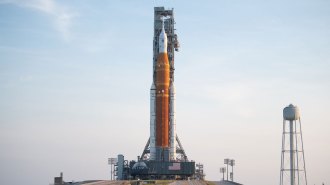 Space
SpaceNASA’s Artemis I mission sets the stage for our return to the moon
The launch will test many aspects of the rocket, capsule and spacesuits that will take astronauts back to the moon.
-
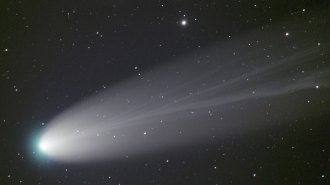 Planetary Science
Planetary ScienceOort cloud comets may spin themselves to death
How icy objects from the solar system’s fringe break up as they near the sun is a long-standing mystery. One astronomer now thinks he has an answer.
-
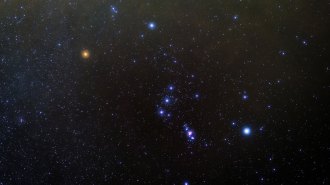 Space
SpaceOver time, Betelgeuse changed color. Now it’s also lost its rhythm
A recent upset to the star’s variability and ancient records that describe the red star as yellow tell a tale of a star that is no stranger to change.
-
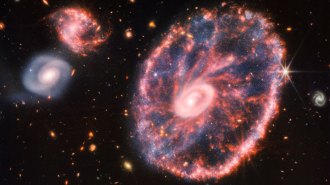 Astronomy
AstronomyA new James Webb telescope image reveals a galactic collision’s aftermath
Bright and dusty spokes of star formation connect the Cartwheel Galaxy’s inner and outer rings in a new image from NASA’s James Webb Space Telescope.
-
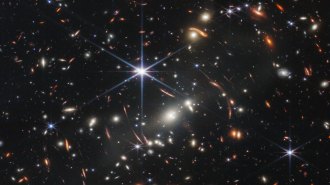 Astronomy
AstronomyHow James Webb Space Telescope data have already revealed surprises
A distant galaxy cluster’s violent past and the onset of star formation in the more remote universe lie buried in the observatory’s first image.
-
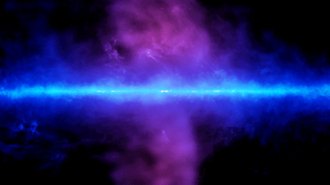 Astronomy
AstronomyClouds in the Milky Way’s plasma bubbles came from the starry disk — and far beyond
Gas clouds in the Fermi bubbles have a wide range of chemical compositions, suggesting some may have been ripped from other galaxies.
-
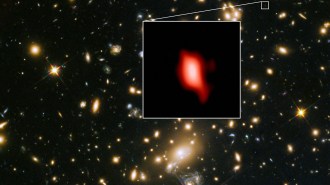 Astronomy
AstronomyThe most distant rotating galaxy hails from 13.3 billion years ago
Astronomers have spotted a rotating galaxy whose light comes from just 500 million years after the Big Bang.
-
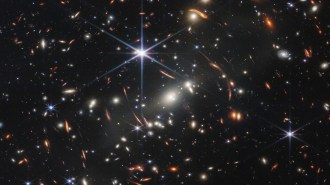 Astronomy
AstronomyHere are the James Webb Space Telescope’s stunning first pictures
President Biden revealed the NASA telescope's image of ancient galaxies whose light has been traveling 13 billion years to reach us.
-
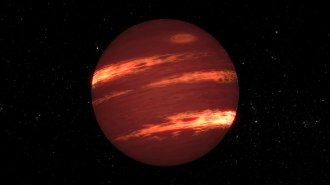 Astronomy
AstronomySand clouds are common in atmospheres of brown dwarfs
Dozens of newly examined brown dwarfs have clouds of silicates, confirming an old theory and revealing how these failed stars live.
-
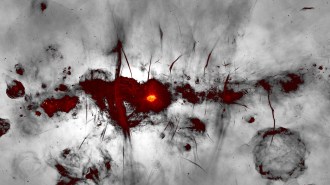 Space
SpaceThe heart of the Milky Way looks like contemporary art in this new radio image
The MeerKAT telescope array in South Africa provided this image of radio emissions from the center of our galaxy using data taken over three years.
-
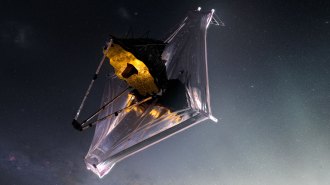 Astronomy
AstronomyThe James Webb Space Telescope has reached its new home at last
The most powerful telescope ever launched still has a long to-do list before it can start doing science.
-
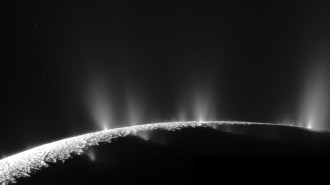 Planetary Science
Planetary ScienceEnceladus’ plumes might not come from an underground ocean
The celebrated plumes of Saturn’s moon Enceladus could come from pockets of watery mush in the moon’s icy shell, simulations suggest.